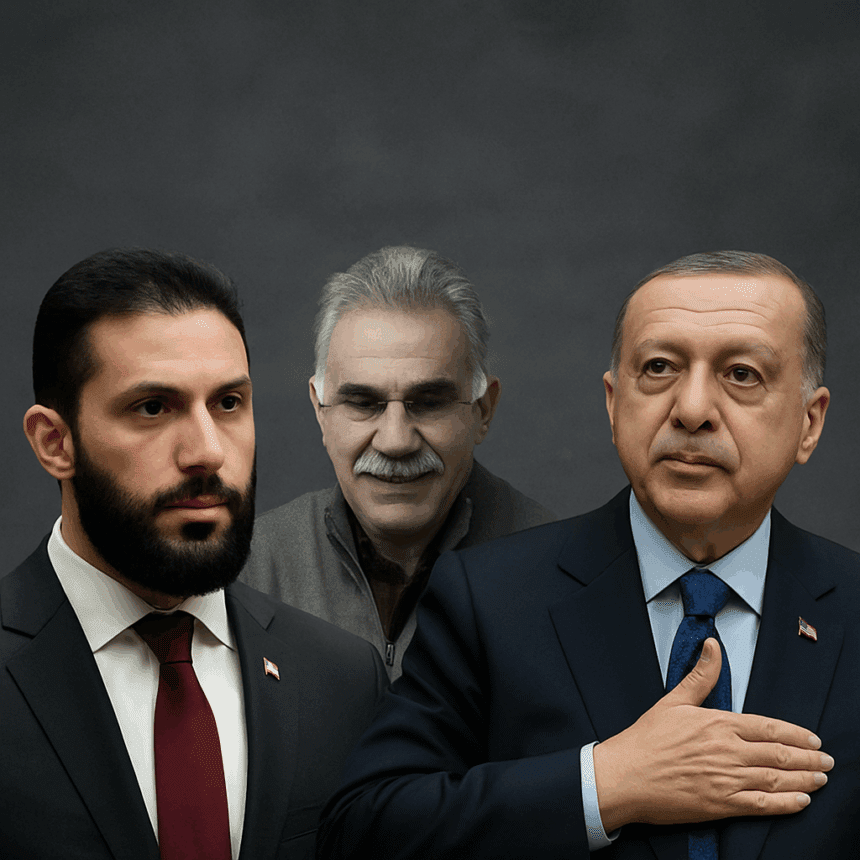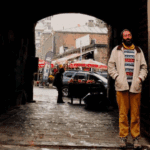A new and important chapter in Kurdish politics has begun with the PKK’s official disbandment after Abdullah Öcalan called for peace and a democratic society. This change isn’t only about stopping the fighting; it’s also about changing what power, identity, and statehood mean in the 21st century. The idea of “positive integration” and the use of Öcalan’s model of democratic confederalism are at the heart of this change. This is a radical alternative to the nation-state that aims to organize society from the bottom up, based on autonomy, pluralism, ecological sustainability, and gender equality (Jongerden, 2019).
The PKK congress that took place from May 5 to 7, 2025, after Öcalan’s clear call for disbandment and disarmament, was a crucial part of this change. But there is still a lot of talk about what this step means, especially for Syria. Öcalan told the Syrian Democratic Forces (SDF) that they do not seek a state and instead want a united, democratic Syria. Some reports claim that Öcalan has seen the peace process in Turkey as part of a larger change in the area and has kept in touch with high-ranking PYD/YPG/SDF leaders in Rojava. The appeal for unification is not about constructing a state, but about strengthening democratic systems across borders based on self-governance and local involvement.
Öcalan’s idea of “democratic integration” was explained in his 160-page Manifesto for Peace and Democratic Society. He said, “Integration means the unity of democratic society with the nation-state… [It] also means equality.” It is set up through negotiations that are open to everyone. Öcalan uses the word “society” to mean Kurds, and he tells them to integrate not by becoming a state, but by using democratic means in Turkey, Iraq, Syria, and Iran. He says that the future rests in changing these nation-states from the inside out instead of trying to break free from them.
Before the congress, Öcalan is said to have delivered a message to the leaders of the PYD and SDF that said, “In this new time, there is no place for a state.” We want Syria to be a unified democracy. The PYD needs to focus on making itself stronger inside local democracy based on the values we talked about. He also said that a democratic Syria would make armaments useless: “Weapons mean enmity.” “Hostility will also go away when weapons are taken away.”
This way of phrasing things shows that Öcalan is moving away from statist socialism and toward a model that is more in line with communalist and anarchist ideas. Öcalan’s idea of revolution is different from the classical revolutions of the 20th century, which tried to take over or change the government. Instead, he sees revolution as a way to rebuild society. It goes beyond the Marxist-Leninist idea of hierarchical control and into a networked, community system where authority is spread out instead of concentrated (Gürbey, Hofmann & Ibrahim Seyder, 2017; Törnquist, 2013). In this view, the state is no longer the end objective or container of freedom; it is only one player in a pluralistic democratic ecology.
The principle of constructive integration is at the heart of this new vision. Öcalan says that instead of separatist nationalism or becoming part of the dominant state structures, Kurds and other oppressed groups should work together to change the political system while keeping their identities. Positive integration is about living together peacefully through democratic negotiation, not giving in (Gök, 2020). It gives us a way to change the nation-state from the inside out without copying its authoritarian roots.
There are examples around the world that illustrate that this kind of framework can work. For example, Quebec has cultural autonomy inside Canada, Bolivia has a plurinational state model under Evo Morales, and Scotland is semi-sovereign in the UK (Bebbington et al., 2018). In these circumstances, identity is not erased; it is kept and become stronger. Rojava, the autonomous Kurdish-led territory in northern Syria, is probably the best example of democratic confederalism in action. It is being practiced through local assemblies, gender co-leadership, and grassroots government (Dirik, 2016; Knapp, Flach & Ayboga, 2016). In that place, stateless democracy isn’t just a theory; it’s a genuine thing.
Anarchist philosophy has always come up with radical ways to replace centralized power structures and systems of coercion (Marshall, 2008; Kinna, 2009). It comes from an intellectual lineage that is against the state and very critical of hierarchy and authority. Abdullah Öcalan’s ideas of “democratic nation” and “democratic confederalism” have been more popular in anarchist writing in recent years. Öcalan’s criticisms of the state, power, hierarchy, and the relationship between humans and environment have grown in scope, especially because of the ideas of Murray Bookchin (Biehl, 2015; Bookchin, 2005).
The arguments between Mikhail Bakunin and Karl Marx in the 19th century show how different anarchist and Marxist ideas are. Marx and Bakunin both criticized capitalist exploitation, but Marx pushed for a proletarian-led state as a necessary step toward a better society. Bakunin, on the other hand, said that any kind of state, including a workers’ state, would lead to further domination (Bakunin, 1972; Graham, 2005). Bakunin was against centralism and vanguardism and instead supported direct participation through local assemblies. In 1872, Bakunin was kicked out of the First International because of the historical split. Marx’s theories led to Soviet-style socialism, while Bakunin’s ideals lingered on in anarchist and direct-action movements.
Öcalan, who has called the state “one of the most dangerous inventions in human history,” sees the idea of a stateless democracy as a return to that 19th-century discussion in the modern Middle East. Since 2012, Rojava has built self-governing organizations such communes, assemblies, women’s councils, and defence groups. These are examples of Bakunin’s vision of a stateless society (Knapp et al., 2016; Leezenberg, 2016). Öcalan doesn’t directly mention Bakunin, but his model brings back the spirit of the suppressed anarchist movement. It offers a decentralized and pluralistic alternative to the colonial and authoritarian governmental institutions that are common in the area.
This new way of thinking places women at the centre, which is very important. The Party of Free Women of Kurdistan (PAJK) and other Kurdish women’s groups say that the success of the democratic change hinges on breaking down patriarchal structures (ANF, 2025d). Öcalan has said that a man who can’t relate to a woman on equal terms can’t be a socialist. So, gender liberation isn’t a side issue; it’s the basis of social freedom and a test of how real a revolution is (Tax, 2016).
But there are still problems. There is still a lot of tension between the Syrian Democratic Forces (SDF) and the HTS-led interim government commanded by Ahmed al-Sharaa in Syria. Öcalan’s focus on democratic unity and rejection of both state fragmentation and vanguard rule puts him at conflict with many people in the region. Still, important SDF leaders like Mazloum Abdi and Ilham Ahmed keep saying they support Öcalan’s agenda and talk to both Damascus and Ankara. This balancing act in politics shows how fragile, but still going on, the experiment of self-rule without a state is in the area.
Öcalan has always wanted a radical decentralization and stateless democracy, but recent political talk implies that his ideas are surprisingly similar to Turkey’s changing regional policy. We have talked about a Turkish-led confederation or possibly a future federation that would include Turks, Kurds, and Arabs as a way to stabilize the region.
In this new situation, it seems that both Erdoğan and Öcalan are working to create a more flexible political system where ethnic and sectarian identities that used to be enemies may come together within a larger, negotiated framework. This would not be a return to strict nation-state sovereignty. Instead, it would be a new way of governing that represents both Öcalan’s idea of democratic integration and Erdoğan’s desire to have more power in the area through managed pluralism.
Recent comments and analysis on Erdoğan’s so-called “Three-Nation Vision,” which is similar to the Ottoman millet system—a way of governing that gave religious and ethnic groups some freedom under a shared imperial umbrella—support this idea. U.S. envoy Tom Barrack’s comments about the Ottoman Empire’s diversity and his idea that it could be a model for living together today add to this story.
The Syrian Observatory for Human Rights (SOHR) also says that if the talks between the Autonomous Administration of North and East Syria (Rojava) and Damascus fail, Rojava may try to get closer to Turkey. They might even use the Misak-ı Millî (National Pact) as a symbolic and strategic framework for reconfiguration. In this view, the Misak-ı Millî is not a demand to annex land, but a plan for unity after the end of the state that is based on cultural diversity and negotiated autonomy.
Significantly, even figures from Turkey’s nationalist right are leaning into this inclusive momentum. Devlet Bahçeli, leader of the Nationalist Movement Party (MHP) and close ally to Erdoğan, recently proposed appointing one Kurdish and one Alevi vice president. Presented as a step toward healing long-standing ethnic and sectarian rifts, Bahçeli’s move underscores how formerly rigid nationalist ideologies may be softening under the pressures—and opportunities—of the current moment.
In this context, a possible Turkish-led confederation or federal model could come up, one based on negotiated autonomy and cultural diversity. Öcalan’s vision is still based on direct democracy and horizontalism, whereas Erdoğan’s is based on religious unity and government centred on the state. But both models try to get over the zero-sum nationalism that has been a problem in the region for a hundred years.
By: News About Turkey (NAT)
References
Bakunin, M. (1972). Statism and Anarchy (M. S. Shatz, Trans.). Cambridge University Press.
Bebbington, A., Humphreys Bebbington, D., Bury, J., Lingan, J., Muñoz, J. P., & Scurrah, M. (2018). Plurinational Democracy: The Politics of Indigenous Rights in Bolivia. University of Michigan Press.
Biehl, J. (2015). Ecology or Catastrophe: The Life of Murray Bookchin. Oxford University Press.
Bookchin, M. (2005). The Ecology of Freedom: The Emergence and Dissolution of Hierarchy. AK Press.
Dirik, D. (2016). The Rojava experiment: Building stateless democracy in Syria. ROAR Magazine. https://roarmag.org/essays/rojava-stateless-democracy/
Gök, F. (2020). Kürt sorunu ve demokratik uyum: Öcalan’ın paradigması. Toplum ve Bilim, 153, 55–77.
Graham, R. (2005). Anarchism: A Documentary History of Libertarian Ideas, Volume 1. Black Rose Books.
Gürbey, G., Hofmann, S., & Ibrahim Seyder, F. (Eds.). (2017). The Kurdish Conflict in Turkey: Political, Social and Historical Perspectives. Routledge.
Jongerden, J. (2019). Pushing back the state: Theories of Kurdish autonomy in Syria. In M. Casier & J. Jongerden (Eds.), Kurdish Politics in the Middle East (pp. 140–162). Palgrave Macmillan.
Kinna, R. (2009). The Continuum Companion to Anarchism. Bloomsbury.
Knapp, M., Flach, A., & Ayboga, E. (2016). Revolution in Rojava: Democratic Autonomy and Women’s Liberation in Syrian Kurdistan. Pluto Press.
Leezenberg, M. (2016). The ambiguities of democratic autonomy: The Kurdish movement in Turkey and Rojava. Southeast European and Black Sea Studies, 16(4), 671–690.
Marshall, P. (2008). Demanding the Impossible: A History of Anarchism. PM Press.
Tax, M. (2016). A Road Unforeseen: Women Fight the Islamic State. Bellevue Literary Press.
Törnquist, O. (2013). Assessing participatory democracy in theory and practice. Studies in Comparative International Development, 48(1), 58–78.



